

 |
 |
||||
| Home | Reviews | Extras | Forums |
|
Valvrave the Liberator (Seasons 1 and 2)SynopsisIn the year True Calendar (T.C.) 71, the majority of the human race lives in space; Earth is divided between the competing powers of the Dorssia Military Pact Federation and the Atlantic Rim United States, with a third, minor nation, JIOR, being neutral and surviving on the basis of an economy that's prosperous and large relative to the actual size of the country. A JIOR high school student named Haruto Tokishima lives in Space Module 77, which is composed of essentially just his classmates and teachers. One day, Dorssia abruptly breaks its peace treaty with JIOR and overruns the country; it seems that Haruto's high school and the other Modules are next, but in the midst of the attack on Module 77 Haruto stumbles upon a mysterious, humanoid fighting machine, the Valvrave, hidden underground. He enters the cockpit and finds that the machine's computer interface has a human avatar, which asks him whether he wishes to give up his humanity in order to pilot the ship. In desperation, he does so and the machine plugs into his body, linking him to it; thus, perhaps Module 77 and JIOR itself will have a fighting chance against Dorssia, but at what cost? ReviewContent Warning: This review discusses rape. Reader discretion advised. There is a single, infamous scene that defines Sunrise’s 2013 mecha series Valvrave the Liberator to many, and that is the scene in which Haruto Tokishima, our main character, apparently possessed by some supernatural force, rapes one of his female classmates, Saki Rukino, who tearfully embraces him, even as he continues to commit violence against her, and declares that this condition is his “cross to bear." To those readers who might find this description triggering, I apologize for that, but I think it needs to be said that if such is the case for you, stay the hell away from this show; in fact, the same should apply for anybody whose sensibilities would be offended by a show depicting a woman first defending and then falling so deeply in love with her own rapist (which is precisely what happens here). For those of us that might hope to salvage anything else from this miserable little series, let it be known that Valvrave’s lax attitude towards sexual violence, while perhaps its most heinous aspect, is far, far from its only problem: it also has the misfortune of being a joyless, jumbled chimera of concepts taken from other mecha shows, and I assure you that regardless of which series this show lifted a particular trope from, that particular series is undoubtedly more enjoyable to watch than this one. If there's any saving grace to Valvrave, it's that for all its many failings, it's at least somewhat nice to look at and listen to; the two opening themes in particular, a pair of collaborations between Nana Mizuki and T.M. Revolution, are effectively dramatic and sweeping and definitely deserved to be in a better series. Akira Senju's symphonic soundtrack bolsters the action scenes well, as does the animation, with Valvrave following in the steps of Macross Frontier in rendering its mecha battles into dazzling, colorful spectacles for the viewer's benefit. But while no amount of pretty animation or music could truly save Valvrave, I think, the technical merits here are still not quite nice enough for me to really cut the show any slack: yes, it's competently animated and scored, and the character design is nice, but it also suffers from having the bright colors of the mecha clash badly with the dull tones of the module and the characters themselves, and when we're in the school or on earth itself the entirety looks rather muddled, grey, and over-shadowed. It's competent but uninspired-looking, and that, perhaps, can function as a decent lead-in to one of my biggest gripes: just as it attempts to emulate the like of Macross Frontier in regards to the choreography and layout of its battles, Valvrave, like Dr. Frankenstein's monster, is composed of a patchwork of elements lifted from better series, but unlike said pitiable creature, it's incapable of developing a soul of its own. 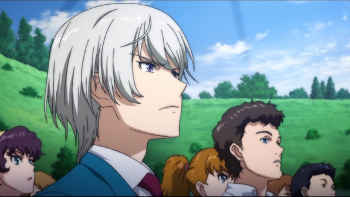 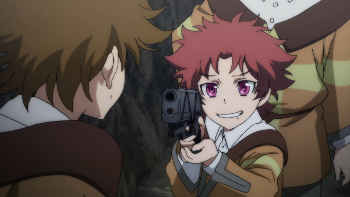 I've come across a lot of articles and reviews that have compared Valvrave to Gundam, and there's enough of a similarity between the colonies-versus-homeland plot of the original Mobile Suit Gundam anime and the David-versus-Goliath dynamic of the JIOR students' stand against Dorssia to make me think that this is intentional. If there's something else that Dorssia reminds me of, it's the Britannian Empire of Code Geass, as both are highly jingoistic and self-righteously militant societies, and both are clearly modeled after a real-world country; in fact, I highly doubt that this similarity is coincidental, either, as screenwriter Ichiro Okouchi worked on both series. In this case, the names of the Dorssian citizens and the appearance of the Dorssian capital city indicate that it's a stand-in for Germany, and I can't help but think that this show's equating Germany with an Orwellian dictatorship, death camps, and militant expansion is in rather poor taste given how close it comes to equating the modern day state and people with Nazi Germany and possibly Communist East Germany as well. In fact, given that this series also depicts the people of ARUS, an obvious stand-in for the United States, as being opportunistic, cowardly, and sneaky, while depicting JIOR and its own citizenry as invariably brave, noble, and pure (at least ostensibly), it borders on nationalist propaganda. That's not to say that, say, Code Geass didn't have this problem, but Valvrave somehow manages to carry over all the problems that said series had as it takes its basic structure, without any of the entertainment value. Similarly when Valvrave introduces the fact that its mecha are, actually, something close to a living being that makes a sort of "contract" with its pilot, it's simply not that interesting because Evangelion, RahXephon, and, once again, Code Geass had been doing this for years before anybody had even coined the term "Valvrave". Which isn't to say that this ruins Valvrave in and of itself, as homages to one's own genre can be effective in some cases, but the show finds no soul of its own. Perhaps it's because the staff were interested in recreating the feel of other series at the expense of developing an interesting and standalone core to this one, and Okouchi shoots himself in the foot by making Valvrave so self-consciously similar to other entries in the mecha genre. Without such a core, Valvrave just ends up being confounding and, in its use of supernatural elements, extremely inconsistent: the side effects of Haruto's "infection" by the Valvrave seem to manifest, early on, as seizure-like fits that result in such lovely scenes such as those mentioned at the start of this review, but later on, the main concern of humans using Valvraves is that it apparently drains their life force. That idea strikes me as being far too similar to a primary plot point of Bokurano: Ours to be a coincidence, and the fact that this idea only appears during the second season makes me think that during the break between seasons, the writers were left scrambling for a means of filling in their plot holes and settled on this one out of convenience. Another case in which this lack of forethought manifests itself is when the show appears to kill off characters in order to motivate Haruto to action, only to reveal that they're alive as soon as he's gotten off to a start and use them for some other purpose. It's cynical and it's tiresome, to say the very least. 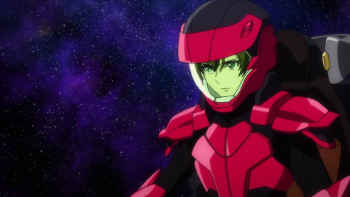 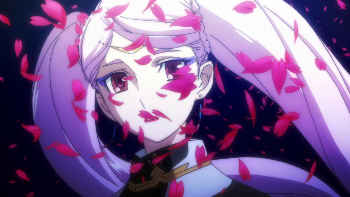 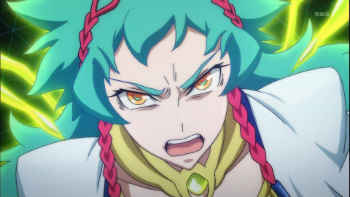 Indeed, Valvrave's characters frequently feel far more like tools to advance the plot than people. Okouchi attempts to give the series both an everyman-with-latent-potential protagonist and a dark anti-hero with Haruto and his Dorssian rival L-elf, respectively, but both are empty of conviction and therefore ultimately uninteresting. Haruto's interactions with his (obvious) crush, Shouko Sashinami early on seem to do a much better job of establishing him as an ass than anybody worth our sympathy: there's a running joke about him making fun of Shouko's choice of T-shirts when he flakes out on admitting his feelings to her, which is stupid and clunky even as the often stupid and clunky trope of botched confessions goes. Even if he indeed does rape Saki Rukino while "not in his own mind," meanwhile, the complete lack of consequences he faces for this, and the fact that he still goes on piloting the Valvrave, left me with absolutely no capacity for sympathy for him as early on as the middle of the first season. L-elf is a tad bit better, but he chooses to essentially abandon Dorssia and collaborate with Haruto (if not exactly befriend him) for reasons that seem to amount only to his thinking the Valvraves are interesting and capable of building a "new world order;" later on, the show abruptly makes up some nonsense about his infatuation with a Dorssian noble of sorts and his desire to free her as being a motivation, but it struck me, again, as having been pulled out of a box of ready-to-use, no-assembly-required anime tropes on the fly. I didn't exactly hate any of the other characters, save for Q-vier, one of L-elf's former companions and a homicidal, trigger-happy maniac who likes to smile and laugh as he kills his victims (I tend to dislike this character type in general), but I can't say I cared much for any of them, either. I at least felt sorry for Rukino after what happened to her, but she's too generically stuck-up and snooty to care much for, otherwise, and the show's establishing her as a former, washed-out idol to explain this is half-baked and too obviously a reference to the Macross franchise to work. Most of the Dorssians are little more than cackling megalomaniacs, and the show's attempts to add nuance to this via references to Dorssia having a "Royalist" faction seeking to overcome the current regime come too late and with too little development to make a difference. The vast majority of the characters, hence the setting, are high school students; this strains the credibility of the series, somewhat, in that we're expected to believe that Shouko (who becomes the module's prime minister) and the others would so effectively put together such a defense operation, with so few hitches; Valvrave's subsequent blink-and-you'll miss it revelation that all of the students in the module were chosen because of their potential to be pilots is, again, simply too convenient once again. 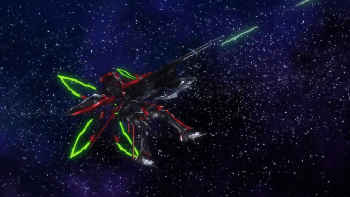 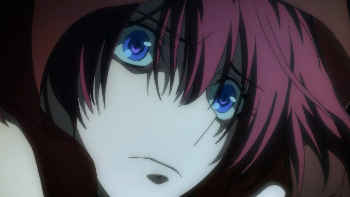 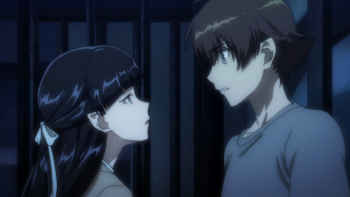 Valvrave has many, many problems: it is rapey, frequently exploitative in its depiction of violence, shoddily written, and patched together from ideas taken from anime tropes at large and from other mecha series, both good and bad. But its core problem, ultimately, is that it simply has no core. It is an empty shell of a series, and, in my opinion, an utter and complete waste of time as a result. I've given better ratings to series that are arguably much worse and much more offensive than this one, with Kite coming to mind as as example, but in each of those cases there was at least something at the center that could be followed and picked apart, something with some consistency to it. There is simply nothing inside of Valvrave the Liberator, and in tandem with its content, there's something especially horrifying to me about that. So here it is: Valvrave, or Valvrape as perhaps better fits its horrifyingly lax attitude towards sexual violence. I could give it a slightly better rating, based on its visuals and occasional moments of entertainment value, but there's a reason I won't: it's a void. I see it as nothing more than an empty space with pieces of other series and scenes of pure shock value thrown into it, and I therefore can do nothing less than flunk it. — Nicole MacLean Recommended Audience: Those triggered by rape scenes should not watch this under any circumstances, and given how that one scene is handled, I'm not sure if the rest of us should be, either. It's not, in fact, the only scene of harassment and groping in this series. The series is marked by graphic violence almost from start to finish, meanwhile, and you have an essentially unobstructed view of human bodies gushing blood much of the time. Version(s) Viewed: Stream courtesy of crunchyroll.com (Japanese with English Subtitles) Review Status: Full (24/24) Valvrave the Liberator (Seasons 1 and 2) © 2013 Sunrise/VVV Committee/MBS |
 |
|
| © 1996-2015 THEM Anime Reviews. All rights reserved. |